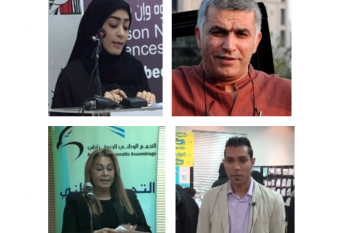(AhlulBayt News Agency) - The Bahrain Center for Human Rights (BCHR) is deeply concerned over the continued targeting of its members. As of now, all the public figures of BCHR inside Bahrain are banned from leaving the country, some are detained or/and prosecuted.
In the run-up to the 33rd session of the UN Human Rights Council (UNHRC) held in Geneva, the government of Bahrain, once more, has taken measures to hinder the work of human rights defenders and members of BCHR by imposing travel bans on them and preventing them from leaving Bahrain. Such actions are another step in a series of measures undertaken by the Bahraini authorities throughout the past months to disturb BCHR work and to impede our international advocacy efforts.
In its most recent attempt to hamper BCHR’s work, the government of Bahrain imposed a travel ban on Nedal Al-Salman, BCHR’s Head of International Relations, on 29 August 2016. Based on an order by the public prosecution, she reported that she was not allowed to leave the country from the Bahrain International Airport. Al-Salman intended to travel to Geneva to participate in the UNHRC’s 33rd session, particularly in order to voice concerns about and draw attention to the recent and already several months-long government crackdown on human rights defenders and civil society members in Bahrain.
On 23 August 2016, BCHR’s documentation team member, Hussain Radhi, was not permitted to leave Bahrain. He was informed by officials at the airport that the travel ban was imposed based on an order by the Criminal Investigation Department (CID) order. When Radhi approached public prosecution to request the removal of the travel ban, his request was rejected and he was informed there is a case against him over remarks he made on Twitter, alleged to be "spreading false news and inciting hatred against the regime." The authorities have not officially informed Radhi of the case before nor he was questioned over these charges.
This is not the first time Radhi has been prevented from traveling. On 12 June 2016, the authorities prevented him from leaving the country to participate in the UNHRC’s 32nd Session in Geneva. Last year, Radhi was tried for illegal gathering, and was eventually acquitted.
On 22 August 2016, Enas Oun, head of BCHR’s Monitoring and Documentation Section, was stopped by Bahraini authorities at Bahrain International Airport, while on her way to a human rights workshop in Tunisia. The authorities informed her that she cannot travel based on an order issued by the CID on the previous day.
The Bahraini authorities arrested BCHR’s president Nabeel Rajab on 13 June 2016. They began a trial against him related to charges concerning remarks he made on Twitter about torture in Bahrain’s Jau Prison and the war in Yemen. He awaits trial on 5 September 2016.
Rajab is suffering poor detention conditions since his arrest. His health has deteriorated as a result. He has been transported to the hospital several times. Most recently, on 25 August 2016, he suffered from shortness of breath and chest pain. This is not Rajab’s first arrest; he has been repeatedly arrested since 2011 and was detained for a total of two years between 2012 and 2015 in violation of his right to freedom of expression. Prior to his arrest, Rajab was arbitrarily prevented from traveling since 2014.
Through its efforts to unveil abuses and raise awareness, BCHR has become a frequent target of government repression. The authorities dissolved BCHR in November 2004 following a speech by human rights defender Abdulhadi Al-Khawaja, President of BCHR at the time, in which he criticized the prime minister. Since 2010, there was not a single year where at least one of BCHR’s leadership members was not in prison. Moreover, BCHR’s Vice-President Said Yousef Al-Muhafdah was forced to seek exile in Germany after he became a target of arbitrary arrest for his human rights work. BCHR website is blocked in Bahrain and alternative links are frequently blocked to disallow locals from reaching the human rights data published by BCHR.
The clampdown and travel restrictions placed on activists and human rights defenders have included: Ahmed Al-Safar and Ebtisam Al-Saegh of the European-Bahraini Organisation for Human Rights, lawyer Mohammed Al-Tajer, Isa Al-Ghayeb, director of Lualua Center for Human Rights, and others who prefer to remain anonymous.
BCHR believes that by enforcing travel bans and prosecuting human rights defenders, the authorities are attempting to prevent all human rights work and cover up the human rights violations in the country. The measures are in direct violation of the International Covenant on Civil and Political Rights (ICCPR) to which Bahrain is a signatory. Article 12(2) of the ICCPR states that “everyone shall be free to leave any country, including his [or her] own,” while Article 19 guarantees the right to free expression.
In view of the abovementioned, BCHR calls upon the government of Bahrain to:
- Ensure the right to freedom of movement guaranteed through the ICCPR and Bahrain’s constitution by withdrawing all currently imposed travel bans in order to allow human rights defender to travel freely;
- Facilitate cooperation with UN bodies and refrain from any actions that might interfere with the work of human rights defenders;
- Immediately release all human rights defenders and political prisoners, including Nabeel Rajab and Abdulhadi Al-Khawaja, who are detained for expressing their opinions; and
- Ensure the right to freedom of expression and freedom of speech in Bahrain, as guaranteed through the ICCPR, and refrain from any acts of reprisal based on the right to free expression.
/129

